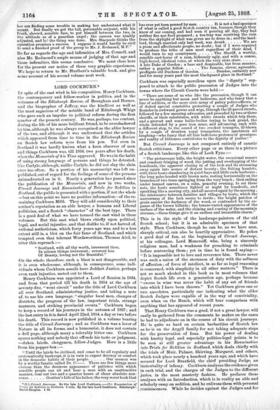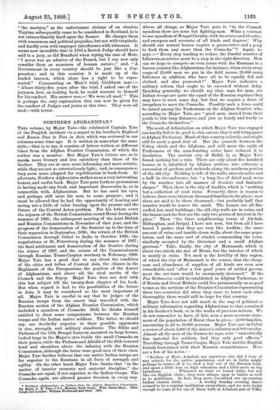LORD COCKBURN.*
IN spite of the east wind in his composition, Henry Cockburn, the contemporary and fellow-worker in politics, and in the columns of the Edinburgh Review, of Brougham and Horner, and the biographer of Jeffrey, was the kindliest as well as the most sagacious of the notable band of Edinburgh Whigs who gave such an impulse to political reform during the first quarter of the present century. He was, perhaps, too content, during the life of his more brilliant friend, to be overshadowed by him, although he was always recognised as the abler lawyer of the two, and although it was understood that the articles which appeared from time to time in the Edinburgh Review on Scotch law reform wirre from his pen. Yet even in Scotland it was hardly known what a keen observer of men and things Cockburn was, till 1856, two years after his death, when the Memorials of his Time appeared. He was in the habit
of using strong language of persons and things he detested, like Carlyle, although, unlike Carlyle, he did not slay the slain once too often. So a portion of his manuscript was left un- published, out of regard for the feelings of some of the persons animadverted on in it. Nearly a generation has passed since
the publication of the Memorials, and now in two works, Circuit Journeys and Examination of Trials for Sedition in Scotland, the public is presented with a portion, if not the whole —but on this point we have no positiye information—of the re- maining Cockburn MSS. They will add considerably to their author's reputation as an able lawyer, a humane and Liberal
politician, and a Scotch " character " of the best type. There is a good deal of what we have termed the east wind in these volumes. But this east wind blows chiefly upon political, legal, and social injustice, and that dislike to, if not hatred of, rational iestheticism, which forty years ago was, and to a less extent still is, a blot on the fair fame of Scotland, and which tempted even that tolerant Wordsworthian, Thomas Aird, to utter this reproach :—
" Scotland, with all thy worth, irreverent thou, In solemn things irreverent; reverent leas Of Beauty, loving not the Beautiful."
On the whole, therefore, such a blast is not disagreeable, and it is even wholesome, although, in consequence, some indi- viduals whom Cockburn assails have Jeddart Justice, perhaps even rank injustice, meted out to them.
Henry Cockburn was appointed a Lord of Session in 1834, and from that period till his death in 1854 at the age of seventy-five, "went circuit" under the title of Lord Cockburn all over Scotland, administering justice, and taking a note of, to use his own language, "singular local men, changes of districts, the progress of the law, important trials, strange manners, and striking provincial events." Cockburn began to keep a record of his journeys in the autumn of 1837; and the last entry in it is dated April 22nd, 1854, a day or two before
his death. This record is now published in a volume bearing the title of Circuit Journeys ; and as Cockburn was a lover of
Nature in all its forms, and a hurnourist, it does not contain a dull page, although many a tolerably bitter one. Cockburn spares nothing and nobody that offends his taste or judgment, —dukes, lairds, clergymen, fellow-Judges. Here is a little from his pepper-box :--
" Until the lairds be civilised, and cease to be all regularly and systematically bankrupt, it is in vain to expect decency or comfort
in the domestic habits of their people Our sermon was by a worthy fanatic called Dr. C—. There are few things more curious than the decorous appearance of patience with which sensible people can sit and hear a man with an unattractive manner, roar out two and a quarter hours of sheer absolute non- sense Grattan's Life of his father, the very worst book that
• (1.) Circuit Journeys. B. the late Lord Cooltburn.—(2.1 Rumination of Trials for Sedition in Scotland. 2 vols. By the late Lord Cockburn. Edinburgh: David Donk& 1 RI
has ever yet been penned by man It is not a bad specimen of what is called a good Scotch country inn, because, though they knew of our coming, and had seen it pouring all day, they had neither fire nor food prepared; a tea-tray was receiving the rain from the skylight of what was given me to dress in ; and the land- lord, though married only last week, was drunk Wears a pious and affectionate people, no doubt; but if I were required to produce the tribe of men most regardless of their dead, I would turn to my countrymen The Sheriff, a worthy, sensible cart-horse of a man, hideously ugly, and with a coarse,
high-keyed, idiotical voice, at which the very stets stare A late Duke of Gordon ; a base and despicable, but from manner,
rather a popular fellow The famous, clever, agreeable, proffigate old Duchess of Gordon Dundee, certainly now and for many years past the most blackguard place in Scotland."
Cockburn was especially merciless upon the " dignity " sup- posed to attach to the public procession of Judges into the towns where the Circuit Courts were held :—
" There are some of us who like the procession, though it can never be anything but mean and ludicrous, and who fancy that a line of soldiers, or the more civic array of paltry police-officers, or of doited special constables protecting a couple of Judges who flounder in awkward gowns and wigs, through the ill-paved streets, followed by a few sneering advocates, and preceded by two or three sheriffs, or their substitutes, with white swords which trip them, and a provost and some bailie-bodies trying to look grand, the whole defended by a poor iron mace, and advancing, each with a different step, to the sound of two cracked trumpets, ill-blown by a couple of drunken royal trumpeters, the spectators all laughing—who fancy that all this ludicrous pretence of greatness and reality of littleness contributes to the dignity of justice ! "
But Circuit Journeys is not composed entirely of caustic Scotch criticisms. Every other page or so there is a picture of a Scotch landscape, like this of Loch Fyne :— " The picturesque hills, the bright water, the occasional masses and constant fringing of wood, the jutting and overlapping of the headlands, the apparent closing in of the loch and its streaming away again into scenes of distant beauty; the fishing hamlets, with their boats slumbering in quiet bays and little rude harbours ; the long poles hooded with brown nets, resting horizontally on the branches of two trees springing from the very beach ; then sailing under tanned canvas, on a calm, peaceful evening, to set these nets, the boats sometimes lighted at night by hundreds, and sparkling like a moving city, and all moored again by the morning ; the intercourse between families and villages by boats, which the narrowness of the loch seems to invite ; the bright patches of grain amidst the darkness of the wood, or contrasted by the ex- panse of the brown hillside; the breeze-varied appearances of the surface of the water, and the shining and roaring of the mountain streams,—these things give it an endless and irresistible charm."
This is in the style of the landscape-painters of the .old Scotch school ; but it is an admirable specimen of that style. Then Cockburn, though he can be, as we have seen, sharply critical, can also be heartily appreciative. He pokes a good deal of fun, at the beginning of Circuit Journeys, at his colleague, Lord Moncreiff, who, being a sincerely religious man, had a weakness for preaching to criminals before sentencing them ; yet in time be is found saying:— " It is impossible not to love and reverence him. There never was such a union of the sternness of duty with the softness of affection ; of force of intellect, in so far as legal reasoning is concerned., with simplicity in all other matters." There is not so much alcohol in this book as in most volumes that depict Scotch life even a generation ago, perhaps because "excess in wine was never the habit of any set of friends into which I have been thrown." Yet Cockburn gives one or two anecdotes, particularly one indicating what the older Scotch Judges were capable of in the way of conviviality, even when on the Bench, which will bear comparison with- anything that has appeared of recent years.
That Henry Cockburn was a good, if not a great lawyer, will easily be gathered from the comments he makes on the eases he had to adjudicate on in the course of his circuit journeys. He' is quite as hard on certain barbarities of Scotch law as he is on the Argyll family for not taking adequate steps for the preservation of Iona. But his power of dealing with knotty legal, and especially politico-legal points, is to
to seen at still greater advantage in his Examination into Trials for Sedition in Scotland, which deals chiefly with the trials of Muir, Palmer, Skirving, Margarot, and others,
which took place nearly a hundred years ago, and which have secured for Lord Brax-field, the 'chief presiding Judge, an imlitortality of infamy. Cockburn analyses the evidence given in each trial, and the charges of the Judges to the different juries, in the most masterly fashion. He prefaces these analyses with an Introduction, which is in reality an able and scholarly essay on sedition, and he enlivens them with personal . reminiscences. While he decides against the Judges and for
"the martyrs," as the unfortunate victims of an obsolete TOryis' m subsequently came to be considered in Scotland, he is not extraordinarily hard upon the former. He charges them with coarseness and political prejudice, but not with turpitude, and hardly even with improper interference with witnesses. It seems now incredible that in 1793 a Scotch Judge should have said to a jury, as did Braxfield when trying the case of Muir, "I never was an admirer of the French, but I can now only consider them as monsters of human nature ;" and, "A Government in every country should be just like a Cor- poration; and in this country, it is made up of the landed interest, which alone has a right to be repre- sented." Commenting on Muir's trial, Cockburn says :— " About thirty-five years after the trial, I asked one of the jurymen, how, on looking back, he could account to himself for his conduct. His answer was,—' We were all mad." This is perhaps the only explanation that can now be given for the conduct of Judges and juries at this time. They were all mad,—with terror.



































 Previous page
Previous page